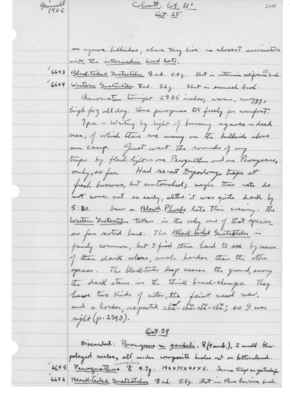Pages That Mention Black Phoebe
1925: Joseph Grinnell's field notes
S3 Page 67
Collector: Grinnell - 1925 Location: Colnett, Sat. 31 degrees Date: October 28, 1925 ?Page Number: 2609
on agave hillsides, where they live in closest association with the intermedia wood rats.
6643 Black-Tailed Gnatcatcher (female sign) ad. 5.8g. Shot in artemesia californica (?) bush. 6644 Western Gnatcatcher (male sign) ad. 5.6g. Shot in sumach bush.
Barometer tonight 29.85 inches; warm, muggy; high fog all day. One perspires too freely for comfort. 7 p.m. - Writing by light of of burning agaves- dead ones, of which there are many on the hillside above our camp. Just went the rounds of my traps by flash light - one Perognathus and one Peromyscus, only, so far. Had re-set Dipodomys traps at fresh burrows, but untouched; maybe these rats do not come out so early, altho it was quite dark by 5:30. Saw a Black Phoebe late this evening. The Western Gnatcatcher taken is the only one of that species so far noted here. The Black-Tailed Gnatcatcher is fairly common, but I find them hard to see by reason of their dark colors, much harder than the other species. The black-tails keep nearer the ground, among the dark stems in the thick brush-clumps. They have two kinds of notes, the faint nasal mew, and a louder, repeated che-che-che-che; so I was right (p. 2593).
Oct. 29 Discarded: Peromyscus m. gambeli, (female sign) (4 emb.), 2 small blue pelaged males, all under composite bushes out on bottomland. 6645 Perognathus arenarius (male symbol) 9.7g. 142 x 71 x 20 x 5. Same trap as yesterday’s. 6646 Black-Tailed Gnatcatcher (male symbol) 5.8g. Shot in Rhus laurina bush.
